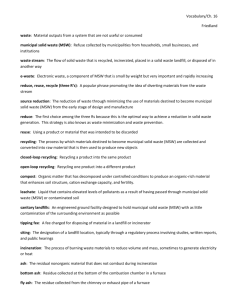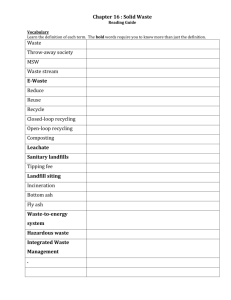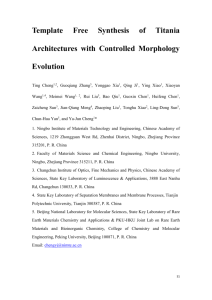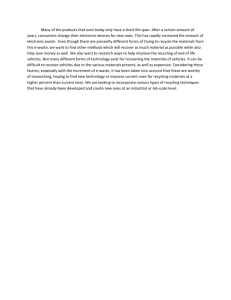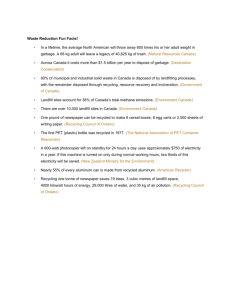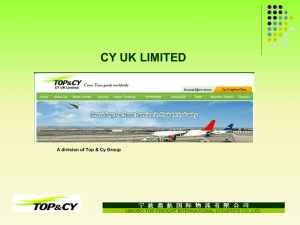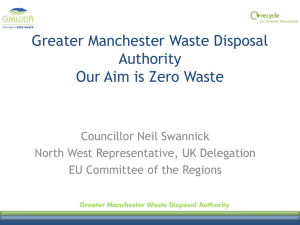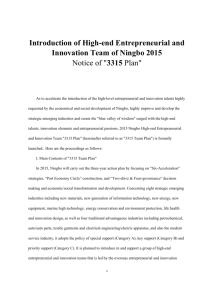A preliminary environmental screening of
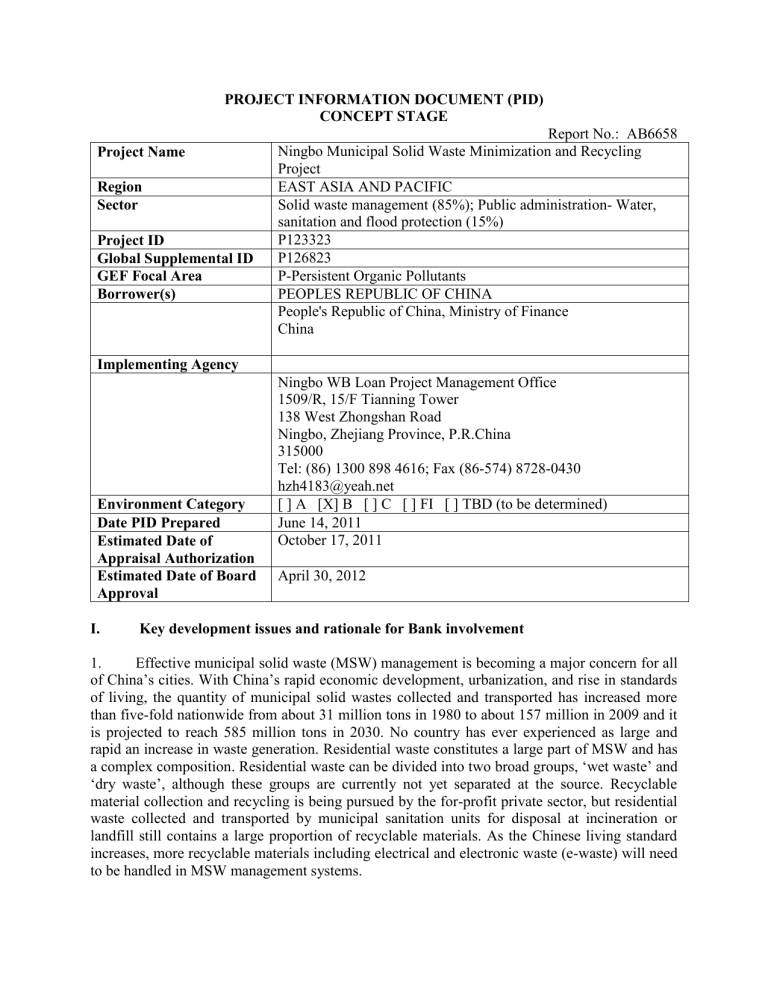
Project Name
PROJECT INFORMATION DOCUMENT (PID)
CONCEPT STAGE
Report No.: AB6658
Ningbo Municipal Solid Waste Minimization and Recycling
Project
Region
Sector
EAST ASIA AND PACIFIC
Solid waste management (85%); Public administration- Water, sanitation and flood protection (15%)
Project ID P123323
Global Supplemental ID P126823
GEF Focal Area
Borrower(s)
P-Persistent Organic Pollutants
PEOPLES REPUBLIC OF CHINA
People's Republic of China, Ministry of Finance
China
Implementing Agency
Ningbo WB Loan Project Management Office
1509/R, 15/F Tianning Tower
138 West Zhongshan Road
Ningbo, Zhejiang Province, P.R.China
315000
Tel: (86) 1300 898 4616; Fax (86-574) 8728-0430 hzh4183@yeah.net
Environment Category [ ] A [X] B [ ] C [ ] FI [ ] TBD (to be determined)
Date PID Prepared
Estimated Date of
Appraisal Authorization
Estimated Date of Board
Approval
June 14, 2011
October 17, 2011
April 30, 2012
I.
Key development issues and rationale for Bank involvement
1.
Effective municipal solid waste (MSW) management is becoming a major concern for all of China’s cities. With China’s rapid economic development, urbanization, and rise in standards of living, the quantity of municipal solid wastes collected and transported has increased more than five-fold nationwide from about 31 million tons in 1980 to about 157 million in 2009 and it is projected to reach 585 million tons in 2030. No country has ever experienced as large and rapid an increase in waste generation. Residential waste constitutes a large part of MSW and has a complex composition. Residential waste can be divided into two broad groups, ‘wet waste’ and
‘dry waste’, although these groups are currently not yet separated at the source. Recyclable material collection and recycling is being pursued by the for-profit private sector, but residential waste collected and transported by municipal sanitation units for disposal at incineration or landfill still contains a large proportion of recyclable materials. As the Chinese living standard increases, more recyclable materials including electrical and electronic waste (e-waste) will need to be handled in MSW management systems.
2.
China urgently needs to make priority efforts to transition from its current, traditional
MSW management practices to a modern model. China needs to move up the hierarchy of waste management, achieving more waste reduction, reuse, recycling, and recovery; and thus minimize the amount of waste that needs to be disposed. In fact, China is making considerable progress in containing and managing industrial solid waste, hazardous waste, medical waste, and waste from restaurants in urban areas, separately from its MSWM system. It has adopted a strategy of experimenting with improved domestic waste management through ‘pilot’ or ‘model’ cities.
Although several cities have tried to implement source separation, unfortunately so far none has truly succeeded due to inadequate waste collection and transportation infrastructure, and low public awareness and participation. To reduce waste and increase recycling, the Chinese government has formulated a number of important laws and development plans linked to municipal solid waste, with sections in the Five Year Plans, the ‘Solid Waste Pollution
Prevention and Control Law’ (2005), and the ‘Circular Economy Promotion Law’ (2009) (see the background study report No.1 in Annex IV for more information). Waste minimization and recycling measures have been recognized as a cost-effective approach in MSW management in
China.
3.
Ningbo Municipality is an important port city on the southeastern coast of China, about
300 km south of Shanghai. It comprises six central urban districts (Haishu, Jiangdong, Jiangbei,
Yingzhou, Beilun and Zhenhai), three county-level cities (Cixi City, Yuyao City and Fenghua
City) and two counties (Xiangshan and Ninghai). In 2009, Ningbo City alone had an urban population of approximately 2.22 million, and a rural population of approximately 1.43 million.
For the last five years, Ningbo’s GDP has grown at an annual rate of 14%. In 2009, the municipality’s GDP was over RMB 65,000 per capita (about US$10,000), much higher than the national average of $3,670.
4.
The city has placed special emphasis on the collection and treatment of industrial, food, and medical waste, and could be considered advanced in China in this regard. Ningbo City produced 1.19 million tons of total MSW in 2009. It has two incineration facilities with designed processing capacity of 1,600 tons per day and two sanitary landfill facilities with design capacity of 1,300 tons per day. The landfill operation has been evaluated by the Ministry of Housing and
Urban and Rural Development as Class I because of good performance. The treatment rate of collected domestic waste from central city districts is 100%. In 2008, the rate of restaurant waste collected and transported had reached 81%. With the steady growth in Ningbo MSW, inadequate processing capacity is becoming a severe problem. According to the forecast from “Ningbo 12th
Five-Year Waste Disposal Facility Construction Plan”, the central city will generate 1.443 million tons of waste per year, with an expected shortage of processing capacity of 1000 ton/day by 2015.
5.
Currently much of Ningbo’s residential waste is not separated prior to being incinerated or disposed in a landfill (with the exception of certain valuable materials which are usually sold by households to recycling markets). As yet, there are no formal businesses engaged in waste electronics and appliance treatment; most of the waste electronic products end up at small and unqualified businesses that dismantle the products to resell the high-value components in an environmentally harmful way (see a background study note in Annex IV for more information).
Major outstanding issues in MSW management in Ningbo City, as identified by the municipal
government and the Bank mission, include: (i) source separation and collection; (ii) waste minimization and utilization of recyclable materials; (iii) e-waste processing and environmental management; and (iv) needed institutional reforms. The City’s Five Year Plan emphasizes waste separation and minimization, material recycling, and environmental management of recyclable material (including e-waste) processing, and institutional and capacity strengthening.
6.
Given the investments which have been done in landfill and incineration and the ongoing efforts the Ningbo Municipal Government (NMG) is carrying out in a broad spectrum of
SWM in Ningbo, the proposed project will not invest in the existing landfill and incineration facilities but minimizing residential wastes transported to some of those facilities through waste separation and recycling.
7.
In conclusion, MSW management is an increasingly important component in ensuring the environmental sustainability of China’s cities. Proper MSW management will generate a great deal of economic benefits, such as improving the environment and the quality of life, reducing exploitation of virgin materials and emissions of pollutants, both local and global, and improving the livelihoods of those employed in the material recycling sector. The results of this project in
Ningbo will be valuable for replication in other cities in China.
8.
The third pillar of World Bank’s Country Partnership Strategy (CPS) for 2006-2010 supports China toward better “managing resource scarcity and environmental challenges” with a focus on improving environmental management and natural resource utilization efficiency to address resource scarcity and environmental challenges’. Thus, the proposed project is in line with the CPS objectives and directions. The CPS also promotes pilot approaches to waste reduction, reuse and recycling, by involving communities and promoting public-private partnership.
9.
A Completion Report on the 2006-2010 CPS is in progress and its lessons will inform the new Strategy. The Chinese Government has requested that the new CPS be co-terminous with, and aligned to, its 12th Five-year Plan (FYP) covering 2011-2015 which will be available in spring 2011. The new CPS will therefore be completed along this timeframe, and will be submitted to the Board for its consideration with the first operation of FY12. The Bank Group is supporting the Government in 12th FYP development, and preliminary consultations on the new
Partnership Strategy have been initiated in parallel. Including this operation, the Bank’s operations all fully consistent with the CPS objectives, supporting investments in energy efficiency, environmental improvements, rural roads, water conservation, small towns, inland waterways, railway, and forestry projects.
II.
Proposed objective(s)
10.
The proposed Project Development Objective is to assist selected districts in Ningbo
Municipality to reduce the proportion of municipal solid wastes disposed at landfill or incineration through waste minimization, source separation, recycling and institutional strengthening.
11.
A results framework, including key results, indicators and a suitable M&E methodology,
will be developed during project preparation. Key monitoring indicators at the identification stage tentatively include: (i) increased proportion of waste diverted from the waste stream before disposal; (ii) increased proportion of residents participating in waste separation; (iii) amount of organic waste composted or digested; and (iv) enhanced regulatory framework for improved municipal solid waste management.
III.
Preliminary description
12.
The proposed project includes a selection of the following components.
Component 1: Waste Minimization through Source Separation, including (1) development of community-based waste separation and collection system; (2) separated transportation; and (3) construction of sorting facilities for resource separation and extraction prior to disposal.
Component 2: Materials Recycling, including (1) recyclable materials processing and trading center and (2) e-waste processing and environmental management facilities.
Component 3: Capacity Building and Implementation Support TA, including institutional strengthening, stakeholder consultation and participation, training and education, awareness raising, and possible pilots of innovative technologies.
13.
Component 1 will be implemented in Haishu District only. Component 2 will cover
Haishu and other central urban districts (namely Jiangdong, Jiangbei, Yingzhou, Beilun and
Zhenhai) of Ningbo Municipality for recyclable material collection and processing.
IV.
Safeguard policies that might apply
[Guideline: Refer to section 5 of the PCN. Which safeguard policies might apply to the project and in what ways? What actions might be needed during project preparation to assess safeguard issues and prepare to mitigate them?]
Safeguard Policies Triggered Yes No TBD
Environmental Assessment (OP/BP 4.01) X
A preliminary environmental screening of proposed project components carried out by the TT during the identification mission indicated that most potential issue will be associated with
Components 1 and 2, that is Community-based Waste Separation, Recyclable Materials
Processing Center and E-Waste Processing and Environmental Management. Likely environmental issues during construction of these facilities will be of short duration and localized. However, siting issues and long term operational impacts need to be analyzed carefully in the EA process. Most of the potential issues are well known and manageable with good engineering practices during construction and operation. Based on the understanding of project investment directly related environmental issues through environmental screening as well as impression of well performed and managed project associated facilities, i.e., existing landfill, incineration, and hazardous waste disposal facilities, from site visits and meeting/discussion with the operators, a Category B is proposed for the project.
Safeguard Policies Triggered Yes No TBD
Proposed EA instrument . With regard to EA instrument and documentation, an EA and EMP document will be prepared in accordance with China’s Environmental Impact Assessment Law and other relevant national policies/regulations and the Bank’s safeguard policies/requirements.
The EA process will follow the necessary steps such as environmental screening, risk assessment, public consultation, and information disclosure, etc.
A due diligence review of three associated facilities - one landfill site, one incinerator, and one existing hazardous waste disposal facility - will be carried out as part of the EA and EMP based upon Chinese requirements and applicable World Bank Group EHS Guidelines. The due diligence will not be limited to certifying compliance with environmental legislation and pollution standards for all facilities, but also include the information/data from monitoring and operation records, evaluation of performance and management, environmental effects, and results of environmental supervision and management by local environmental authority, etc. If warranted remedial measures will be integrated into the EMP.
The scope of the EA and EMP will also need to cover additional need for parking space, which might be considerable as the project will purchase many waste transfer vehicles.
Relevant social impacts related to the project within the area of influence of the project including, if applicable, potential impacts of the project on the livelihood of poor waste pickers that derive part of their livelihood from these areas.
Natural Habitats (OP/BP 4.04) X
Most facilities will be located in well developed urban areas. Based on the information provided by NMPMO and the initial screening by the TT, there are no natural habitats found in the proposed project areas.
Forests (OP/BP 4.36) X
The project will not finance any activities related to forests, and the proposed project components are not located in forest areas.
Pest Management (OP 4.09) X
The proposed project will not finance procurement of pesticides, so that this policy is not triggered.
Physical Cultural Resources (OP/BP 4.11) X
Based on current information available, there are no any physical cultural relics found in project areas. In the EA process, related information will be checked and confirmed by relevant authorities. Chance find procedures will be prepared and included in construction contracts.
Indigenous Peoples (OP/BP 4.10) X
There are no ethnic minority communities which possess the characteristics as defined in OP
4.10 found within Ningbo municipality based on the social screening results carried out by social development specialist in the team. Therefore the proposed project will not trigger the policy.
Involuntary Resettlement (OP/BP 4.12) X
The project will include new construction of sorting facilities for wet waste and sorting center for dry waste, waste transfer stations, recyclable materials processing and trading center and e-waste processing facility. However, the sites of these new constructions have not been defined but it seems that involuntary land acquisition will not be avoidable. In such case, OP 4.12 will be
Safeguard Policies Triggered Yes No TBD applied to this project and the appropriate instruments will be prepared along with the project preparation. Most likely, Resettlement Action Plans will be prepared for all known project sites at appraisal; an RPF will be prepared if specific sites are not identified before appraisal.
The project will likely build some facilities on land that has already been acquired. A due diligence review of land acquisition will be carried out in the case of land acquisition was conducted within two years before project identification in any existing sites or at the sites for new construction. If the land acquisition is not in compliance with Chinese laws and regulations as well as the Bank Policy on
Involuntary Resettlement, remedial measures will be taken.
The project will not invest in landfills and incinerators but will utilize these existing facilities.
Analysis of resettlement linkage will be carried out for these facilities and documented in the project appraisal documents and ISDS at PAD stage.
Safety of Dams (OP/BP 4.37) X
The project will not finance construction or rehabilitation of any dams as defined under this policy. No action is required under this policy.
Projects on International Waterways (OP/BP 7.50) X
There are no known project components involving international waterways as defined under the policy. No action is required under this policy.
Projects in Disputed Areas (OP/BP 7.60) X
There are no known project components involving in disputed areas as defined under the policy.
No action is required under this policy.
Environmental Category: B - Partial Assessment
V.
Tentative financing
Source:
Borrower
International Bank for Reconstruction and Development
Total
($m.)
80
80
160
VI.
Contact point
Contact: Jian Xie
Title: Senior Environmental Specialist
Tel: (202) 473-2766
Email: Jxie@worldbank.org


